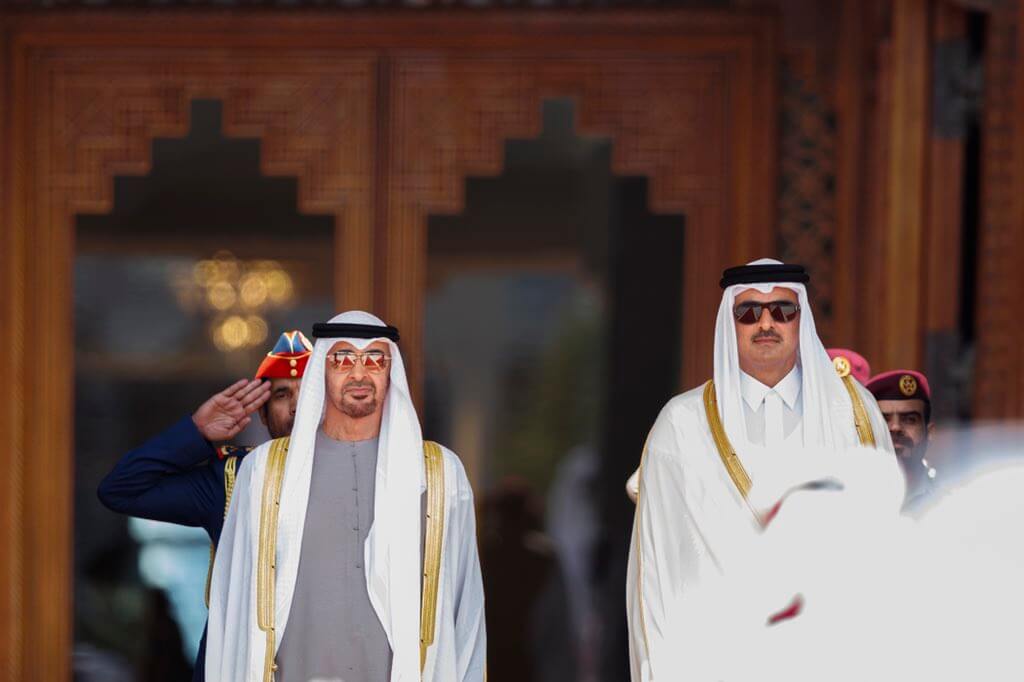Emirati presidential advisor Anwar Gargash on Monday called UAE President Mohammed bin Zayed’s (MBZ) meeting with Qatari Emir Sheikh Tamim bin Hamad Al Thani “another step towards strengthening Gulf solidarity and joint action.” MBZ travelled to Qatar for the first time since the UAE, along with Saudi Arabia and other Gulf allies, imposed a boycott on Qatar in 2017.
Gargash said MBZ’s visit showed Abu Dhabi’s “strategic choice” is regional “cooperation, integration and coordination” towards “achieving common Gulf aspirations.”
Today I arrived in Doha to discuss areas of mutual interests and strengthening bilateral ties between our nations. I congratulate my brother Tamim bin Hamad and the people of Qatar on hosting the FIFA World Cup and wish them continued success. pic.twitter.com/5k4D6CWgKz
— محمد بن زايد (@MohamedBinZayed) December 5, 2022
Qatar News Agency (QNA) reported that the two leaders discussed efforts to improve bilateral ties and push them to a “broader level” in order to “strengthen joint Gulf action.” According to the QNA, they discussed “current issues of common concern” and reviewed regional and international developments.
The Emirati WAM news agency said the MBZ and Al Thani discussed “ways of enhancing their cooperation to advance the common interests of the two countries.” The Qatari Emir said “the visit will strengthen UAE-Qatar cooperation and help expand its horizons,” while MBZ congratulated Qatar for hosting the FIFA World Cup.
أرحب بأخي سمو الشيخ محمد بن زايد آل نهيان في الدوحة الذي اتاحت لنا زيارته التباحث حول سبل تعزيز العلاقات الأخوية بين بلدينا، وتبادل وجهات النظر حول القضايا الإقليمية والدولية ذات الاهتمام المشترك وفي مقدمتها سبل دعم الأمن والاستقرار في المنطقة. pic.twitter.com/Lvifh22ojv
— تميم بن حمد (@TamimBinHamad) December 5, 2022
MBZ said Qatar’s success in hosting the World Cup “is a testament to the ability of the people of the GCC countries and the Arab world in organising global events with great levels of excellence and efficiency.”
Both leaders agreed to “boost prosperity” in their countries by expanding bilateral ties, particularly in the economic, investment, and trade areas. “They also discussed the importance of improving the GCC joint work ecosystem to serve the interests of their peoples and their aspirations towards further development and prosperity,” WAM said.
Qatar is hosting the Middle East’s first football world cup. The event has generated solidarity and brotherhood among Islamic and Gulf countries. In fact, leaders across the region attended the opening ceremony of the FIFA World Cup in Doha, including Saudi Crown Prince Mohammed bin Salman, Egyptian President Abdel Fattah El Sisi, and Emirati Prime Minister Sheikh Mohammed bin Rashid Al Maktoum. All three countries cut diplomatic ties with Qatar in 2017.
UAE President, Emir of Qatar discuss relations, regional developments#WamNews https://t.co/vM4agcTDlh pic.twitter.com/bC4f218kX2
— WAM English (@WAMNEWS_ENG) December 5, 2022
Saudi Arabia, the UAE, Bahrain, and Egypt broke off diplomatic ties with Qatar in 2017 over claims that Doha was getting too close to Tehran and was causing regional unrest by supporting extremists, an allegation that Qatar has fiercely denied. Consequently, the four GCC members imposed a land, sea, and air blockade on Qatar. Jordan, Maldives, Malaysia, Yemen, and Libya further supported the travel ban.
Since 2017, however, there have been efforts at negotiating a return to normalcy between the two sides. In January 2021, Kuwait announced that Saudi Arabia will reopen its borders and airspace to Qatar, in a major step towards ending the bitter dispute. Soon after, during the 41st Gulf Cooperation Council (GCC) summit in Al-Ula, Saudi Arabia, Gulf leaders signed a “solidarity and stability” agreement to end the three-year tiff between Qatar and the Saudi-led regional alliance.

